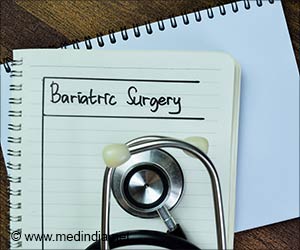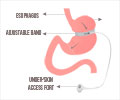- Nielsen S, Svane MS, Bojsen-M�ller KN, Madsbad S (2014) Effects of Bariatric Surgery on Weight Loss and Quality of Life. Anaplastology 3:136 - (doi:10.4172/2161-1173.1000136)
- Neff KJ, Olbers T and le Roux CW. Bariatric surgery: the challenges with candidate selection, individualizing treatment and clinical outcomes. BMC Medicine 2013; 11: - (DOI: 10.1186/1741-7015-11-8)
- Narath SH, Mautner SI, Svehlikova E, Schultes B, Pieber TR, Sinner FM, et al. (2016) An Untargeted Metabolomics Approach to Characterize Short-Term and Long-Term Metabolic Changes after Bariatric Surgery. PLoS ONE 11(9): e0161425 - (doi:10.1371/journal.pone.0161425)
- Miller GD, Hale E, Dunlap G (2015) Current Evidence for Physical Activity in the Bariatric Surgery Patient for Weight Loss Success. J Obes Weight Loss Ther 5:274 - (doi:10.4172/2165-7904.1000274)
- The effect of surgical weight loss on diabetes complications in individuals with class II/III obesity - (https://www.ncbi.nlm.nih.gov/pmc/articles/PMC10011764/)
What is Bariatric Surgery?
Bariatric surgery is a type of digestive tract surgery used to treat obesity. In this surgery, the size of the stomach is surgically reduced so that it holds less quantity of food and therefore reduces the total amounts of calories that are available to the patient. Obese patients who qualify for bariatric surgery include the following:
- Individuals with a body mass index (BMI) of 35 to 40 kg/m2 who have obesity related co-morbidities. Co-morbidities are diseases such as diabetes mellitus or obstructive sleep apnea that commonly occur with the primary disease, in this case, obesity.
- Individuals with a BMI of 40 kg/m2 or greater regardless of the presence or absence of weight related co-morbidities.
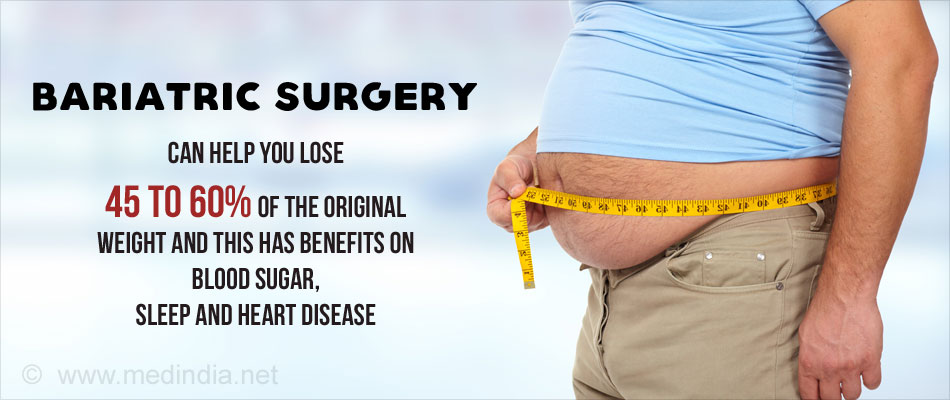
What are the Types of Bariatric Surgery?
Bariatric surgery procedures are of several types. They are commonly done with the help of a laparoscope, though they are sometimes performed as open surgery. Types of bariatric surgery include the following:
Roux-en-Y gastric bypass (RYGB): In the RYGB surgery, a part of the stomach is cut so that only a small pouch remains attached to the food pipe, while the remaining remains attached to the upper small intestine. Another cut is made through the thickness of the small intestine, the lower cut end is attached to the small stomach pouch while the upper end is reattached to a lower level of the intestines.
Laparoscopic adjustable gastric banding (LAGB): LAGB is a surgical technique where an inflatable balloon is placed at the upper end of the stomach through a keyhole surgery. The tightness of the band can be controlled by inserting or removing saline into a port placed under the skin.
Sleeve gastrectomy: Sleeve gastrectomy is a procedure where the volume of the stomach is reduced by removing a large part of the stomach and converting it into a narrow banana-shaped structure.
Biliopancreatic diversion, with or without duodenal switch (BPD and BPD-DS): This procedure is rarely done. The stomach is converted into a narrow pouch similar to the sleeve gastrectomy. A larger length of the intestine is bypassed as compared to RYGB.
Vertical banded gastrectomy: This procedure creates a permanent small vertical stomach pouch with the help of a band and staples.
In the United States over 200,000 bariatric procedures are performed each year for obesity and approximately 80 percent are gastric bypass surgeries.
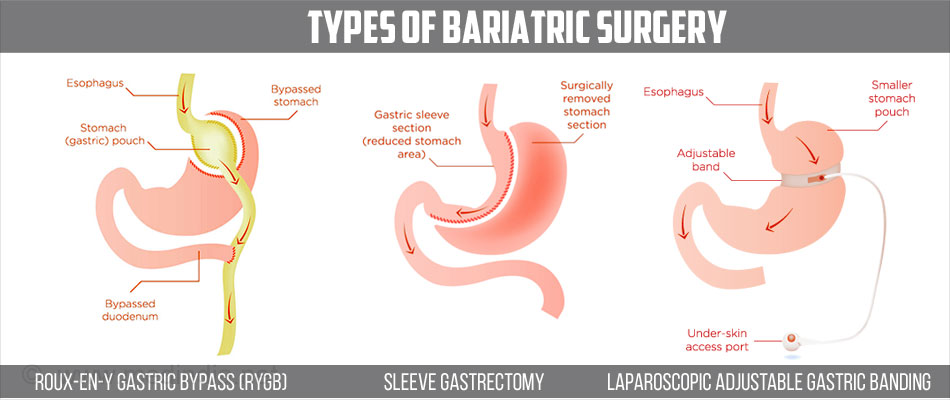
What are the Short-term and Long-term Outcomes of Bariatric Surgery?
The outcomes of bariatric surgery can be divided into favorable and unfavorable.
The most desired favorable outcome is obviously weight loss. The surgery does have other favorable as well as some unfavorable complications along with it.
Favorable outcome following of Bariatric Surgery
1. Weight loss: Weight loss is the purpose and outcome of bariatric surgery. Due to a smaller stomach size, the patient has to limit food intake, which results in weight loss. The amount of weight loss depends on the type of surgery. Extensive surgeries are associated with larger weight loss, and also a higher rate of complications. Limited procedures bring about smaller reductions in weight but have lesser complications.
The patient loses approximately 60% of excess body weight following Roux-en-Y gastric bypass. On the other hand, sleeve gastrectomy and vertical band gastrectomy are associated with around 56% of excess weight loss while the LABG procedure is associated with around 46% of excess weight loss.
The weight loss appears soon after surgery and lasts for a long time. The maximum weight loss is noted in one to two years following the surgery. Following this period, the patient gains some weight which stabilizes after around 8 to 10 years. The patient regains around 20 to 25% of the lost weight by this time.
2. Psychological effect: The body changes due to weight loss following the surgery can have a positive psychological impact on the person. An enhanced body image improves the self-esteem and associated anxiety or depression if present. However, these could recur if the patient puts on weight again.
3. Improvement of obesity-related comorbidities: Obesity is not a single disease, but plays an important causative role in a cluster of other conditions like diabetes, hypertension and obstructive sleep apnea. These conditions show an improvement following bariatric surgery:
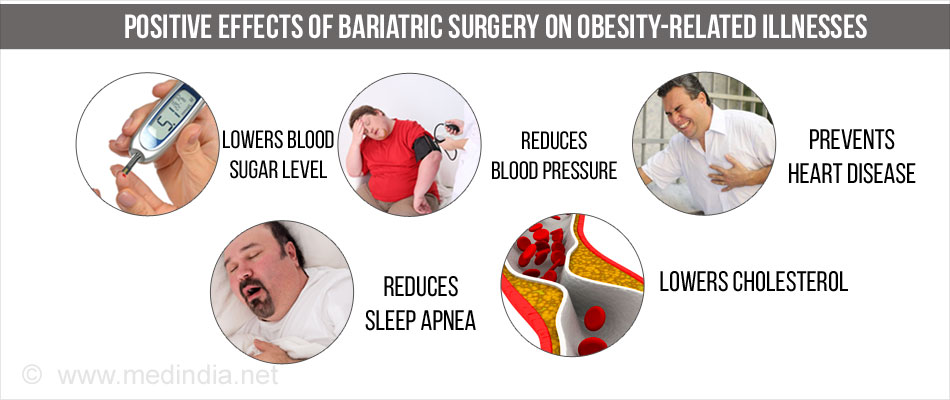
a. Diabetes
The patient usually shows an improvement in diabetes following the bariatric surgery with a reduction in the dosage of insulin or anti-diabetes medication. Therefore, the diabetes control should be carefully monitored in the immediate period following the surgery, and should be continued at a regular interval. The long term complications of diabetes like eye disease and kidney disease are also reduced following the surgery.
Diabetes control may improve in the short term but may recur in the long term. It has been noted that around 72% diabetics become non-diabetics around 2 years following the surgery; however, only 36% continue to remain diabetes-free 10 years after surgery. Patients who undergo RYGB show better diabetes control than those who undergo other limited procedures. People who are likely to recover include those who have had a shorter duration of diabetes, lower HbA1c levels and do not require insulin.
b. Hypertension
Obese patients often suffer from high blood pressure, which improves following bariatric surgery. Therefore, the blood pressure should be regularly monitored following bariatric surgery, and medications should be reduced as necessary. As for diabetes, the improvement in hypertension is noted within two weeks of the surgery.
c. Hyperlipidemia
Obesity is associated with high blood levels of cholesterol and triglyceride which can cause complications like atherosclerosis, hypertension, heart disease and pancreatitis. The blood cholesterol levels reduce within two weeks of surgery, and reduce the chances of long-term complications.
d. Heart disease
Obesity causes heart enlargement. The atherosclerosis associated with obesity can result in a heart attack, which can even result in death. Patients with heart disease show an improvement in heart function and mortality and morbidity due to heart disease. The possible mechanisms for the reduced heart disease following bariatric surgery are an improvement in diabetes, hypertension and abnormal blood cholesterol levels. The patient can also move and exercise more easily, which ultimately improves heart health.
e. Obstructive sleep apnea or Asthma
Obesity causes respiratory problems like obstructive sleep apnea and asthma. In obstructive sleep apnea, the patient stops sleeping for short durations, which disturb sleep and increase the risk for heart attack and high blood pressure. The severity of both OSA and asthma improve following bariatric surgery.
f. Joint pains
Patients with obesity find it difficult to exercise and move around, which only worsens their obesity. Bariatric surgery can improve activities of daily living and encourages people to exercise. It helps to reduce load on the knee joints, and improves pain in joints like the lower back and knee.
4. Improves Cognition: Bariatric surgery has the potential to help with memory problems linked to obesity (class II and class III). It seems to make thinking skills better, especially in tasks that need planning and organization. But it's a bit tricky because it can affect memory in different ways. Understanding these various effects helps us see how different types of bariatric surgeries can have different benefits for our thinking abilities.
Complications or Unfavorable Outcomes of Bariatric Surgery
Like for any other treatment, bariatric surgery also has its share of complications. These include:
1. Dumping syndrome: Dumping syndrome is a condition where the patient experiences symptoms within half an hour to an hour after eating. Similar symptoms may also occur two to three hours after meals, which may be due to low blood sugar levels.
The most common symptoms include:
- Abdominal pain
- Sweating
- Increase in heart rate
- Nausea
- Bloating
- Fatigue
- Facial flushing
- Diarrhea
- Low blood pressure
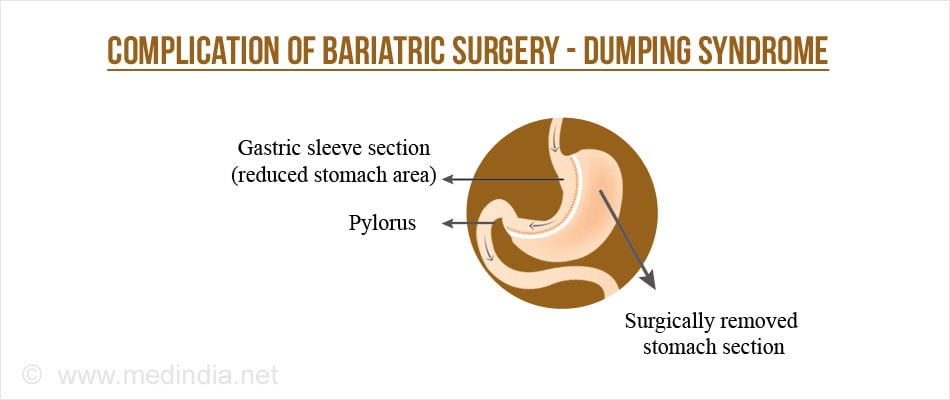
Patients with dumping syndrome may benefit by avoiding excess sugar in the food and eating small meals containing protein and carbohydrates.
Patients may require treatment with acarbose or somatostatin analogues like octreotide.
Acarbose is an anti-diabetes drug that slows the absorption of sugar from the digestive tract.
Octreotide acts through several mechanisms like slowing down movements of the stomach and intestine, reducing hormone levels and acting on blood vessels.
2. Gastroesophageal reflux disease (GERD): GERD is reflux of acid contents of the stomach into the lower food pipe. Patients with obesity often suffer from GERD, which may worsen after bariatric surgery. Marginal gastric ulcers may also occur at the anastomotic site. However, patients undergoing RYGB show a reduction in GERD following the procedure.
3. Some short term surgical complications: Other complications associated with gastrointestinal surgeries may be noted in patients undergoing bariatric surgery in the immediate post-operative period or within the first 1 to 3 months. These include:
- Bleeding or leakage from the anastomotic site. This could result in intra-abdominal and blood infection, resulting in multi-organ failure and even death. The leakage therefore requires urgent treatment.
- Mild symptoms of vomiting and diarrhea, and fecal incontinence following the surgery. If there is no definite cause of vomiting, it can be overcome by proper diet control.
- Gastroesophageal perforation, which may occur following the ABG procedure.
- Wound infection.
- Hernia. Incisional hernia (hernia at the site of the surgical incision) may occur. It is however less common with laparoscopic surgery. An internal hernia may result in bowel obstruction.
- Pulmonary and venous thromboembolism (clot formation in the lungs and veins respectively). These often occur if the patient is immobilized over prolonged periods following the surgery.
- Anastomotic stricture, or narrowing at the anastomotic site, which may occur as a late complication. It occurs in RYGB and can result in difficulty in swallowing and vomiting.
4. Nutritional deficiencies: If the nutrition intake is not adequate, patients can suffer from deficiencies in the long run. The degree of deficiency depends upon the type of procedure.
Protein deficiency is often noted one to two years following the procedure, which can be prevented by a high-protein diet as advised by a dietician. Patients should receive supplements of calcium and vitamins. Patients suffering from iron deficiency may need injectable iron.

5. Appearance of skin folds: The weight loss following the surgery may result in flabby skin folds in the lower abdomen. Flabby skin near the buttocks may make it difficult for the person to sit. The skin folds can accumulate sweat under them and result in redness and soreness. These may require additional plastic surgery, which can add to the cost of treatment.
6. Other side effects: Other side effects like hair loss and increased incidence of gallstones may occur following the surgery.
7. Effect of Alcohol Intake: It has been reported that after bariatric surgery fewer drinks are required for a person to get drunk.
Gastric bypass may result in more rapid absorption of alcohol from the intestines as the alcohol stays for a shorter time in the stomach due to its reduced size. This results in increased sensitivity to alcohol and also increase in the blood level of alcohol. One drink may be enough to get a person above the normal drinking limit. So if you have had bariatric surgery don’t drink and drive.
It has also been reported that alcohol abuse was more likely after bariatric surgery. In a large survey of more than 1,900 bariatric surgery patients was published in the Journal of the American Medical Association (JAMA), it was shown that in the second year following gastric bypass surgery, among those reporting post-surgery alcohol problems, 60.5 percent hadn’t had drinking problems before.
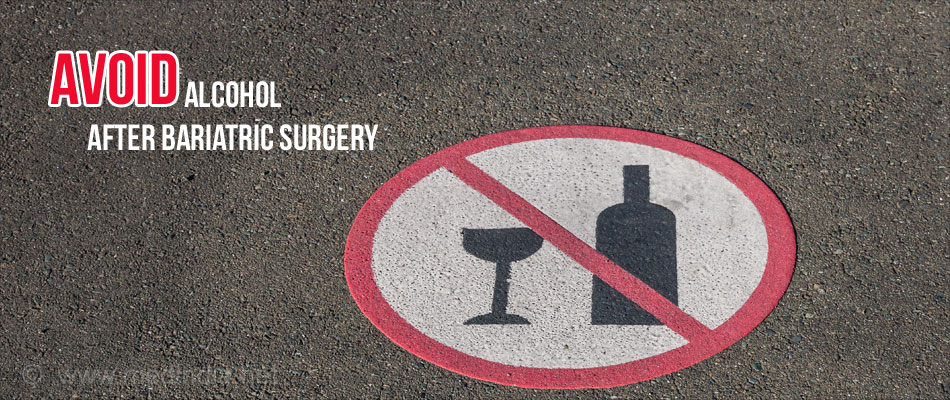
8. Death: The mortality rate following bariatric surgery is extremely low, for example, it is around 0.3% following RYGB. Death is more common following more invasive procedures as compared to banding procedures. Patients who have prior underlying conditions like heart failure have higher chances of death following bariatric surgery. On the other hand, bariatric surgery can reduce the chances of death due to obesity even up to 30%.
The short and long term effects of bariatric surgery are largely dependent on proper patient selection. Thus, if the candidate is properly selected, the benefits of the procedure definitely outweigh the risks. The expectations of the patient should also be set prior to the surgery so as to avoid disappointment.




